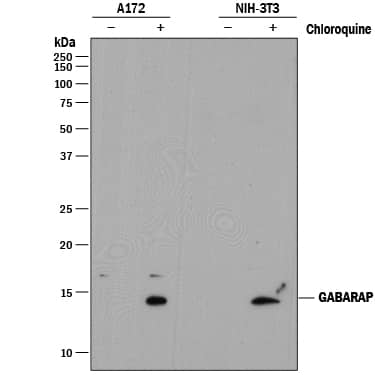GABARAP Products
gamma-Aminobutyric Acid Receptor-associated Protein (GABARAP), also known as Apg8p1, is 117 amino acid (aa) protein with a predicted molecular weight of 14 kDa. It is a member of the GABARAP subfamily of the Autophagy-related 8 (Atg8) family of proteins. The GABARAP subfamily also includes GABARAPL1. GABARAP/Apg8p1 has 100% aa sequence identity with its mouse and rat orthologs and is orthologous to yeast Atg8. Atg8 family members show structural similarity with Ubiquitin, but lack aa sequence similarity. GABARAP/Apg8p1 was first described for its putative involvement GABA A Receptor trafficking. However, it is best known for its role in autophagy. GABARAP/Apg8p1 covalently attaches to phosphatidylethanolamine (PE) in the phagophore (autophagosome precursor) membrane using a Ubiquitin-like conjugation system that includes Ubiquitin-activating (E1)-, Ubiquitin-conjugating (E2)-, and Ubiquitin Ligase (E3)-like enzymes. Here it is involved in the later stages of autophagosome maturation. It may also be involved in cargo recruitment to autophagosomes.
112 results for "GABARAP" in Products
112 results for "GABARAP" in Products
GABARAP Products
gamma-Aminobutyric Acid Receptor-associated Protein (GABARAP), also known as Apg8p1, is 117 amino acid (aa) protein with a predicted molecular weight of 14 kDa. It is a member of the GABARAP subfamily of the Autophagy-related 8 (Atg8) family of proteins. The GABARAP subfamily also includes GABARAPL1. GABARAP/Apg8p1 has 100% aa sequence identity with its mouse and rat orthologs and is orthologous to yeast Atg8. Atg8 family members show structural similarity with Ubiquitin, but lack aa sequence similarity. GABARAP/Apg8p1 was first described for its putative involvement GABA A Receptor trafficking. However, it is best known for its role in autophagy. GABARAP/Apg8p1 covalently attaches to phosphatidylethanolamine (PE) in the phagophore (autophagosome precursor) membrane using a Ubiquitin-like conjugation system that includes Ubiquitin-activating (E1)-, Ubiquitin-conjugating (E2)-, and Ubiquitin Ligase (E3)-like enzymes. Here it is involved in the later stages of autophagosome maturation. It may also be involved in cargo recruitment to autophagosomes.
| Reactivity: | Human |
| Details: | Rat IgG2a Monoclonal Clone #853641 |
| Applications: | WB, ICC |
| Reactivity: | Human, Mouse, Drosophila, Insect - Drosophila |
| Details: | Rabbit IgG Polyclonal |
| Applications: | IHC, WB, ICC/IF |
| Reactivity: | Mouse |
| Details: | Rabbit IgG Polyclonal |
| Applications: | IHC, WB (-), ICC/IF (-) |
| Reactivity: | Human, Rat |
| Details: | Rabbit IgG Polyclonal |
| Applications: | WB |
Recombinant Monoclonal Antibody
| Reactivity: | Human, Mouse, Rat |
| Details: | Rabbit IgG Monoclonal Clone #5T6W5 |
| Applications: | WB |
| Reactivity: | Human |
| Details: | Rabbit IgG Polyclonal |
| Applications: | WB |
| Reactivity: | Human |
| Details: | Rabbit IgG Polyclonal |
| Applications: | WB |
| Reactivity: | Human, Mouse, Drosophila |
| Details: | Rabbit IgG Polyclonal |
| Applications: | IHC, WB, ICC/IF |
| Reactivity: | Mouse |
| Details: | Rabbit IgG Polyclonal |
| Applications: | IHC, WB (-), ICC/IF (-) |
| Reactivity: | Mouse |
| Details: | Rabbit IgG Polyclonal |
| Applications: | IHC, WB (-), ICC/IF (-) |
| Reactivity: | Human, Mouse, Drosophila |
| Details: | Rabbit IgG Polyclonal |
| Applications: | IHC, WB, ICC/IF |
| Reactivity: | Mouse |
| Details: | Rabbit IgG Polyclonal |
| Applications: | IHC, WB (-), ICC/IF (-) |
| Reactivity: | Human, Rat |
| Details: | Rabbit IgG Polyclonal |
| Applications: | WB |
| Reactivity: | Mouse |
| Details: | Rabbit IgG Polyclonal |
| Applications: | IHC, WB (-), ICC/IF (-) |
| Reactivity: | Mouse |
| Details: | Rabbit IgG Polyclonal |
| Applications: | IHC, WB (-), ICC/IF (-) |
| Reactivity: | Human, Rat |
| Details: | Rabbit IgG Polyclonal |
| Applications: | WB |
| Reactivity: | Human |
| Details: | Rabbit IgG Polyclonal |
| Applications: | WB |
| Reactivity: | Human |
| Details: | Rabbit IgG Polyclonal |
| Applications: | WB |
| Reactivity: | Human |
| Details: | Rabbit IgG Polyclonal |
| Applications: | WB |
| Reactivity: | Human, Mouse, Drosophila |
| Details: | Rabbit IgG Polyclonal |
| Applications: | IHC, WB, ICC/IF |
| Reactivity: | Human, Mouse, Drosophila |
| Details: | Rabbit IgG Polyclonal |
| Applications: | IHC, WB, ICC/IF |
| Reactivity: | Mouse |
| Details: | Rabbit IgG Polyclonal |
| Applications: | IHC, WB (-), ICC/IF (-) |
| Reactivity: | Human, Mouse, Drosophila |
| Details: | Rabbit IgG Polyclonal |
| Applications: | IHC, WB, ICC/IF |
| Reactivity: | Human |
| Details: | Rabbit IgG Polyclonal |
| Applications: | WB |
| Reactivity: | Human, Mouse, Drosophila |
| Details: | Rabbit IgG Polyclonal |
| Applications: | IHC, WB, ICC/IF |



![Immunocytochemistry/ Immunofluorescence: GABARAP Antibody - BSA Free [NBP1-71771] Immunocytochemistry/ Immunofluorescence: GABARAP Antibody - BSA Free [NBP1-71771]](https://resources.bio-techne.com/images/products/GABARAP-Antibody-Immunocytochemistry-Immunofluorescence-NBP1-71771-img0008.jpg)
![Immunohistochemistry: GABARAP Antibody - BSA Free [NBP1-97416] Immunohistochemistry: GABARAP Antibody - BSA Free [NBP1-97416]](https://resources.bio-techne.com/images/products/GABARAP-Antibody-Immunohistochemistry-NBP1-97416-img0001.jpg)
![Western Blot: GABARAP AntibodyBSA Free [NB300-158] Western Blot: GABARAP AntibodyBSA Free [NB300-158]](https://resources.bio-techne.com/images/products/GABARAP-Antibody-Western-Blot-NB300-158-img0002.jpg)
![Western Blot: GABARAP Antibody (5T6W5) [NBP3-16376] Western Blot: GABARAP Antibody (5T6W5) [NBP3-16376]](https://resources.bio-techne.com/images/products/GABARAP-Antibody-5T6W5-Western-Blot-NBP3-16376-img0001.jpg)
![Western Blot: GABARAP Antibody [NBP2-99474] Western Blot: GABARAP Antibody [NBP2-99474]](https://resources.bio-techne.com/images/products/GABARAP-Antibody-Western-Blot-NBP2-99474-img0002.jpg)
